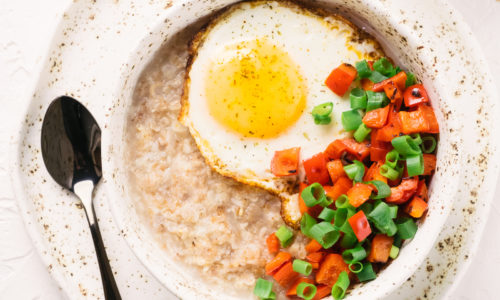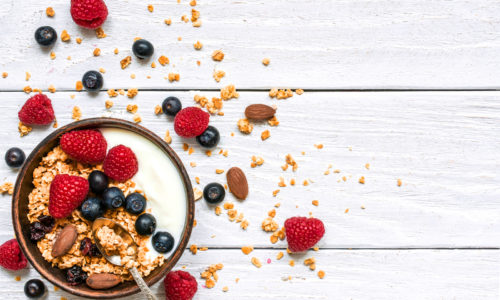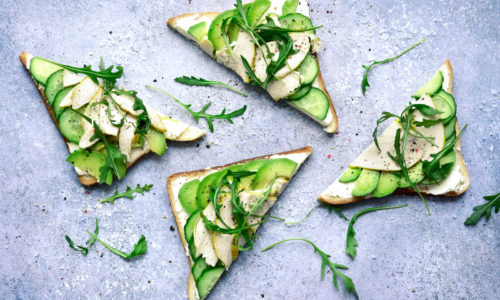 Eat Empowered
Eat Empowered  Healthy Eating Tips
Healthy Eating Tips
5 Breakfast Mistakes to Stop Making for More All-Day Energy
Home » Eat Empowered » 5 Breakfast Mistakes to Stop Making for More All-Day Energy
Emotional eating can be much more subtle than you realize, and if you’re having trouble figuring out your food issues, it may be at the root of them. If you’re a wellness professional (or are just trying to live your healthiest life!), you’ve GOT to understand emotional eating, as it’s likely at the root of many of your clients’ issues. Get informed, here!
While research has never really confirmed that whole “most important meal of the day” reputation, there are many reasons to prioritize eating a healthy breakfast.
First of all, if you eat a well-balanced meal with protein, healthy fat, and fiber, you’re setting yourself up for an energized, productive day. You’re also less likely to overeat if you’ve filled upon on nutrient-dense foods from the get-go.
Plus, if you start your day with a healthy meal, you set yourself up psychologically for a day filled with more healthy choices. (Ever start with a donut and then, come lunchtime, think, “Well, I’ve already eaten crap, might as well go for the fried chicken”?)
But mornings are busy, we know, and it can be tough to fit in the perfect meal. Start by correcting these simple breakfast mistakes and you’ll be well on your way to making amazing, energized choices all day long.
5 Breakfast Mistakes You Should Stop Making
-
1. Skipping breakfast altogether

Lots of people don’t feel hungry right when they wake up, we get it! But if you want to keep your hunger hormones in check and set yourself up for a good mood, it’s worth eating something to lay the foundation for a good-food kind of day. If you’re not a breakfast person, try at least grabbing a small snack, like a handful of nuts and dried fruit (no sugar added of course) or a spoonful of almond or peanut butter. Those are all examples of foods that pack lots of protein and fat into a little bite, so they’ll keep you full for longer than you think.
-
2. Choosing sweet breakfast foods

Lunch foods are rarely sweet, so why should breakfast foods be so sugary? Not only do we associate sweet flavors with the a.m. meal (pancakes! Pop-Tarts!), traditional breakfast foods like cereal and yogurt are also usually hiding tons of added sugar. Here’s the thing: The more sugar you eat off the bat, the harder the crash is going to be. Skip breakfast foods with added sugar and try making traditionally sweet ones savory. Oatmeal, for instance, is delish with a drizzle of olive oil, Parmesan cheese, sea salt, and black pepper. Or try blending avocado into your Greek yogurt or topping it with cucumbers, tomato, and EVOO.
-
3. Overloading on carbs

Breakfast foods also tend to be refined carb-heavy. A piece of toast or bagel with a smear of butter or jam is only convenient. It has practically no nutritional value and you’ll be starving in an hour. An all-star breakfast is a mix of protein and fiber-rich foods—eggs with veggies, Greek yogurt with fruit, nuts, and seeds—a perfect combo to keep your blood sugar steady and your stomach full. If you keep reaching for bready items because they’re fast, try prepping breakfast ahead of time. Overnight oats, for instance, can be made for the whole week ahead and taken to eat on the go.
-
4. Relying on eggs for protein

Okay, eggs, especially scrambled, are definitely a go-to, but you don’t have to eat them so much that it becomes a total drag. Try incorporating more nuts, nut butters, and seeds (like chia) into your rotation. Or, shake up your perception of morning food and eat an “afternoon” protein: a small piece of grilled chicken with a quarter of an avocado and a thick slice of tomato on a piece of whole grain toast makes the perfect open-faced breakfast sandwich.
-
5. Not drinking enough water in the morning

Coffee first, we know. But it’s also important to give your body the precious fluid it needs after a long, dry night. One of the first things you should do every morning is drink a glass of water, ideally with a little lemon. Sometimes thirst fools us into thinking we’re hungry, but if you stay hydrated from the get-go, that’ll be less likely to happen.
(Photos: Shutterstock)
The Nutritious Life Editors are a team of healthy lifestyle enthusiasts who not only subscribe to — and live! — the 8 Pillars of a Nutritious Life, but also have access to some of the savviest thought leaders in the health and wellness space — including our founder and resident dietitian, Keri Glassman. From the hottest trends in wellness to the latest medical science, we stay on top of it all in order to deliver the info YOU need to live your most nutritious life.
RECENT ARTICLES

Want a sneak peek inside the program?
Get FREE access to some of the core training materials that make up our signature program – Become a Nutrition Coach.
Get Access"*" indicates required fields













































































































































































































































































































































































































































































































































































































































































































































































































































































































































































































































































































































































































































































































































































































































